Last Chance to Catch NYC's Holiday Notalgia Train
We met the voices of the NYC subway on our nostalgia ride this weekend!

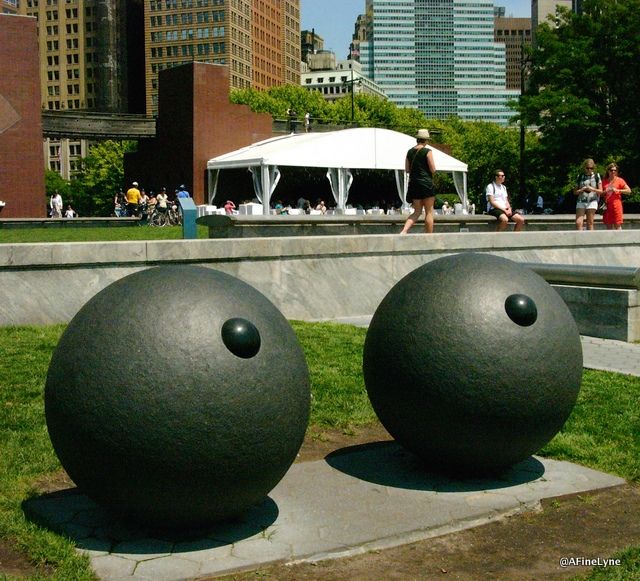
“Eyes”, 1995 by artist Louise Bourgeois
The New York City “Art in the Parks Program” has been a labor of love since its beginning days in 1967. It was then that our City made a commitment to use public space as what they called an outdoor museum, “letting works of art ‘loose’ in the city, to set them under the light of day where they intrude upon our daily walks and errands.” This month, we took a walk along the Esplanade of Battery Park City, viewing a dozen site-specific installations from Pier A to Rockefeller Park.
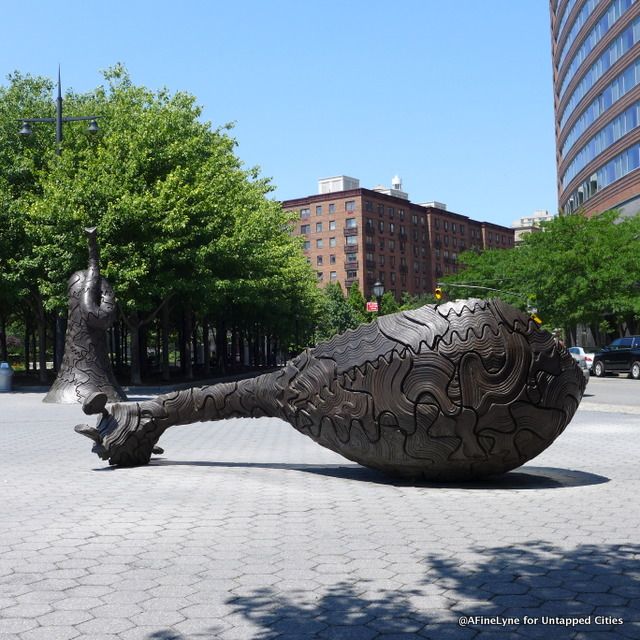
“Resonating Bodies”, 1966 by artist Tony Cragg
Located at the entrance to Robert F. Wagner Jr. Park on the interior Esplanade near Little W Street, are the playful sculptures “Resonating Bodies” by British artist Tony Cragg. The two textured, bronze pieces, resembling giant musical instruments – a lute and a tuba – measure 15′ x 5′ 8″ and 6′ x 15″. You might remember Cragg from his installation in Madison Square Park last year.

“Eyes”, 1995 by artist Louise Bourgeois
The French-born artist, Louise Bourgeois, who moved to Manhattan in the 1940s, was known for welcoming artists into her studio on 20th Street until her death in 2010 at the age of 98. She created the installation aptly names “Eyes” for Battery Park City. These two giant eyes, which are 37″ x 37″ x 37″ and made of granite, seem to be a big hit with children, who climb on them, around them, and they are so large that they even hide behind them. Located in Wagner Park, they are positioned so as to overlook the Hudson River.
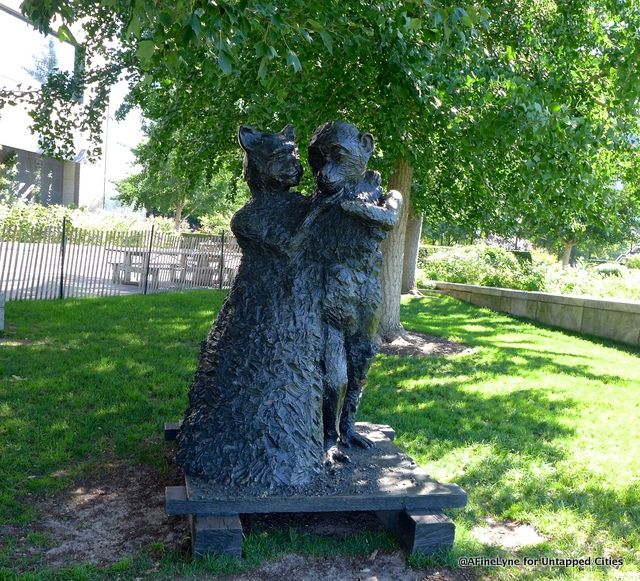
“Ape & Cat” (At the Dance), 1933 by artist Jim Dine
Inspired by a small porcelain figurine of a cat and money in human clothing, artist Jim Dine created a series of sculptures, paintings and drawings. From this series, “Ape & Cat” (at the Dance) is located near the Museum of Jewish Heritage in Wagner Park. Set back in the shade of the trees, it’s easy to miss, even though the bronze piece stands over 6 feet high.
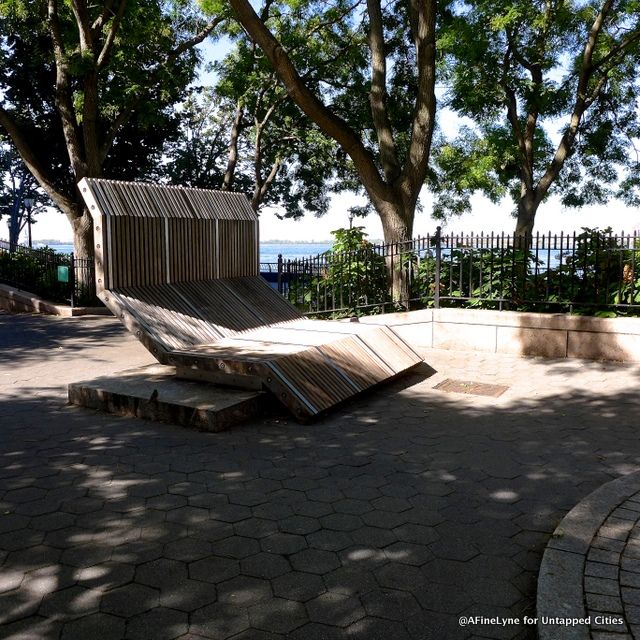
“Sitting/Stance”, 1988 by artist Richard Artschwager
West Thames, off the Esplanade, is a great place to get off your feet. In the shade of the trees, overlooking the Hudson River, you will find five installations – all by artist Richard Artschwager (1923-2013) – and each piece allows for the viewer to sit. Below, a low street lamp surrounded by a circular bench and table; a seating area that appears to be an enlarged tree grate; a granite seat with a tall back; and a pair of very inviting large slatted wooden deck chairs (one of them pictured above).
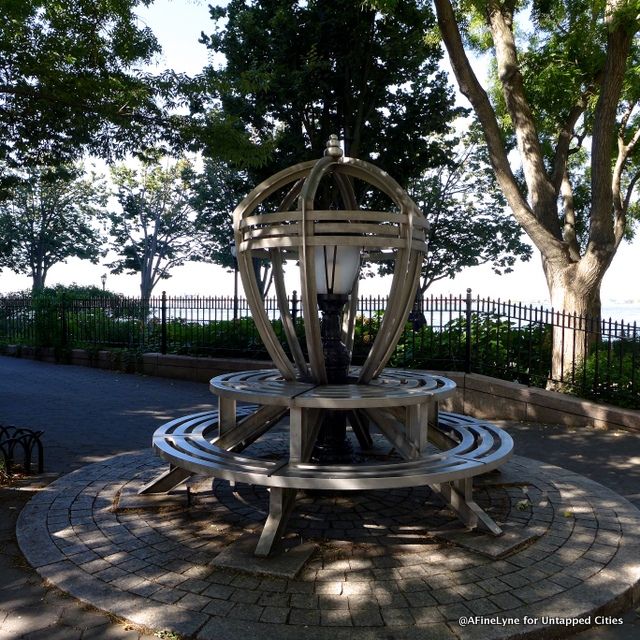
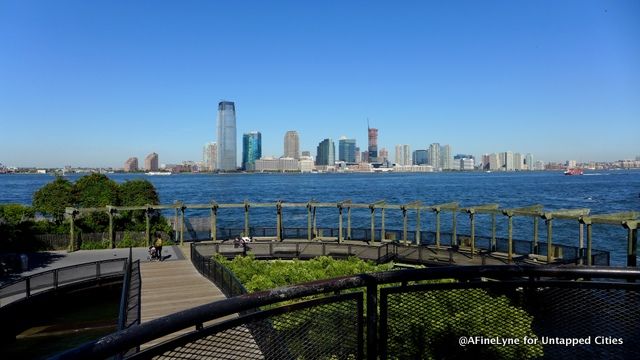
“South Cove” by artist Mary Miss, architect Stanton Eckstut and landscape architect, Susan Child
Overlooking the Harbor and the Hudson River is a large metal structure, in the shape of the prow of a boat, or some have said it gives the feel of the crown of the Statue of Liberty. The installation is named South Cove, and it was designed as a meditative environment, with an arching wooden jetty and distinctive blue lights along the walkway. This work is a collaboration between environmental artist Mary Miss, architect Stanton Eckstut and landscape architect Susan Child.
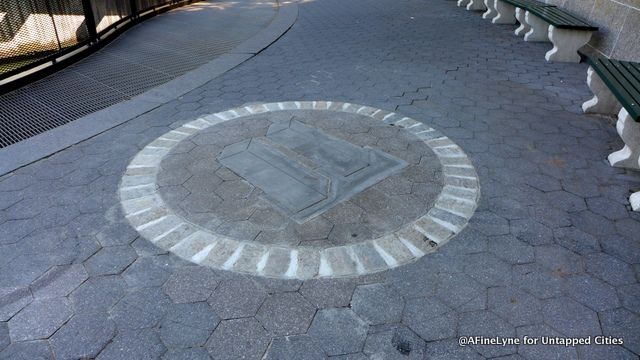
“Circle of Remembrance”
On the wall within the South Cove, there is a plaque that reads “In the immediate aftermath of 9/11, Battery Park City Parks and Authority Employees tirelessly assisted in the clean-up of Battery Park City, revitalizing our parks and restoring our neighborhood to the refuge it is today. We dedicate this oasis within an oasis to honor their efforts.” The Circle of Remembrance holds within it the images of the Twin Towers.
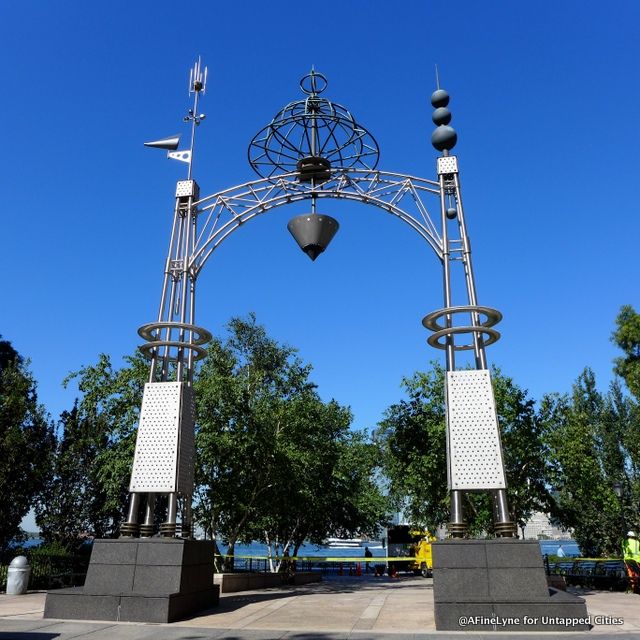
“Rector Gate”, 1988 by artist R.M. Fischer
This grand archway known as Rector Gate marks the intersection of Rector Place and the Hudson River. The arch, created by artist R.M. Fischer, is composed of stainless steel, bronze, granite and in the evening, lighting. Standing over 50 feet, the arch has seating at its base, and is at the entrance to Rector Park.
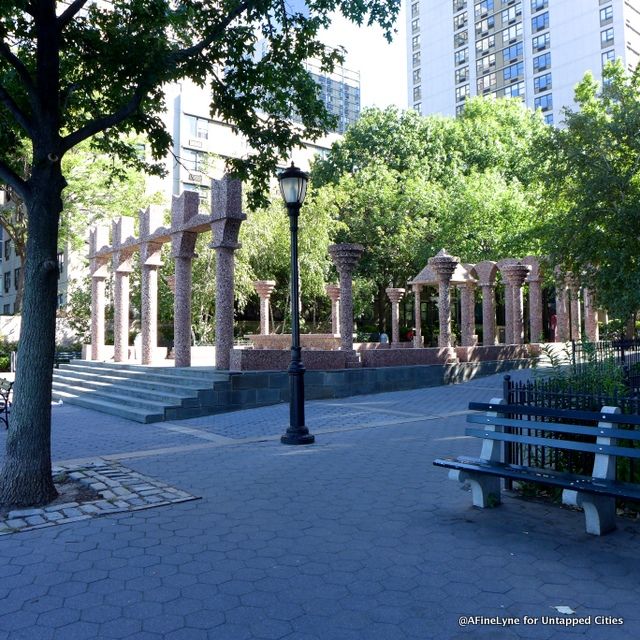
“The Upper Room”, 1987 by artist Ned Smyth
The many gravel and bluestone columns that make up the installation “The Upper Room” is trademark Ned Smyth. Located at the entrance to the Esplanade at Albany Street, the interior of the installation holds a long table with chess boards and twelve stools.
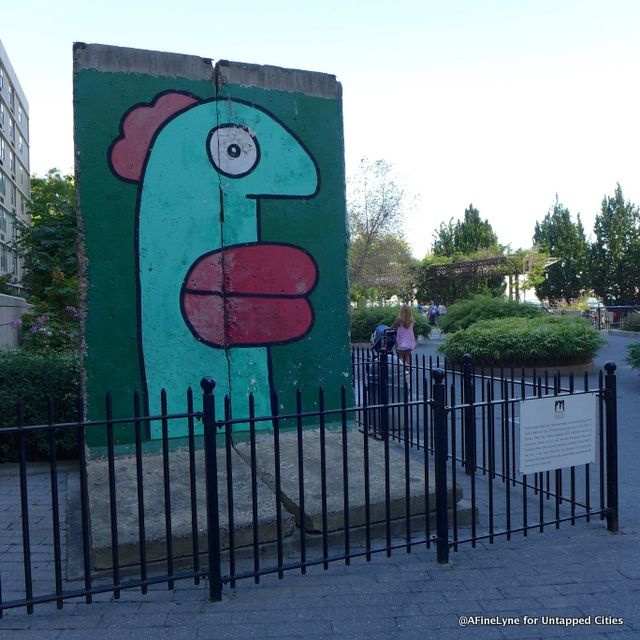
Section of the Berlin Wall painted by French artist Thierry Noir “Big Heads”
The 12′ high by 8′ wide, 2.75 ton sections of the Berlin Wall were a gift in recognition of the 15th anniversary of the fall of the Berlin Wall. These particular sections, now standing back-to-back, once stood between Potsdamer Platz and Leipzig Platz. They stand in Kowsky Plaza, which is named for Monsignor John J. Kowsky (1922-1988), a former chaplain for the New York Police Department.
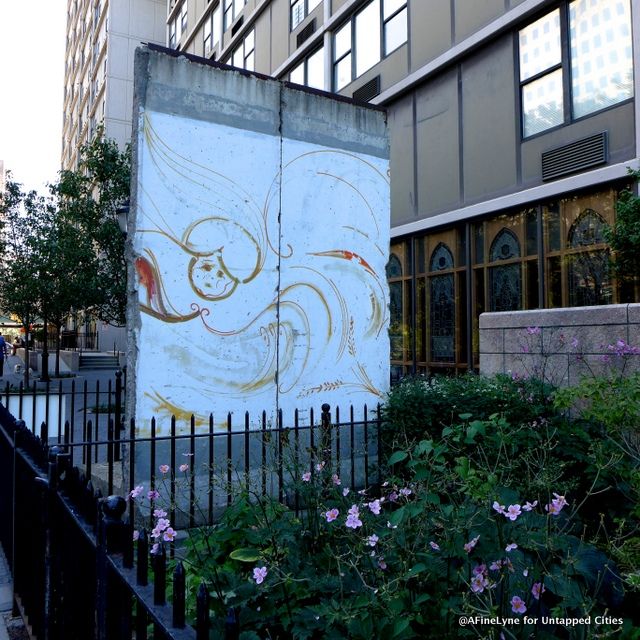
The second section of the Berlin Wall, both sections housed alongside Saint Joseph’s Chapel
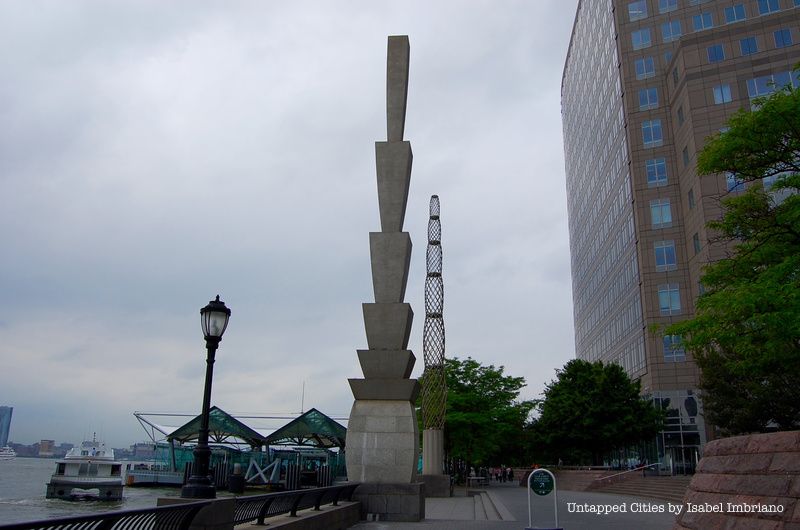
The North Cove “Pylons,”,created by artist Martin Puryear, are located on the Esplanade near Brookfield Place. They are strikingly different – one is a wire mesh and the other, solid and angular. They are made of granite and stainless steel, the tallest is over 70 feet.
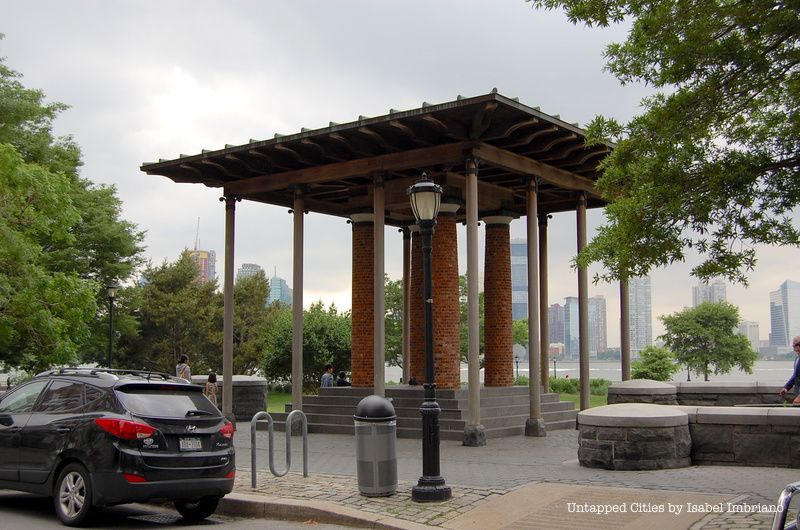
“The Pavilion,” leading into Nelson A. Rockefeller Park, was created by the architect Demetri Porphyrios, is both a structure and a sculpture, sheltering visitors from the sun and rain. The Pavilion is composed of granite, wood, brick and copper. The flat roof is held up by Doric columns and overlooks the Hudson River. The artist sees it as a metaphorical stepping stone on mankind’s journey from primitive to modern. You may recognize this pavilion as the DJ booth at the 2014 Dîner en Blanc, a pop-up dinner for several thousand in Nelson A. Rockefeller Park.
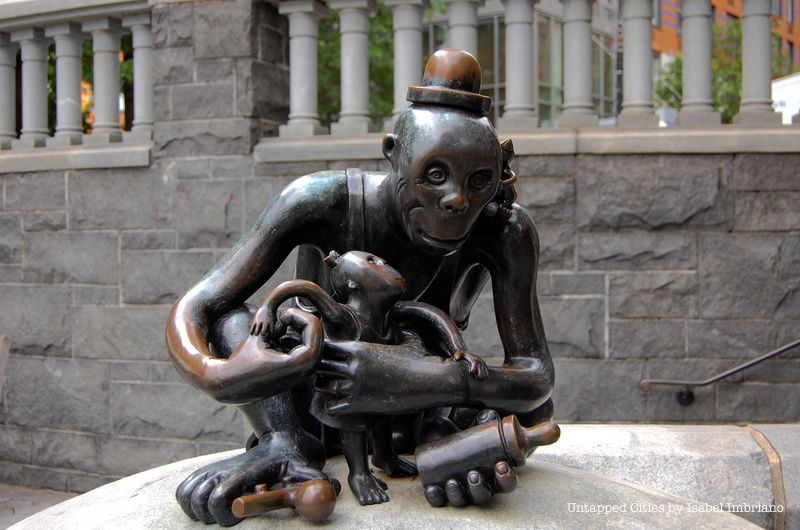
Nelson A. Rockefeller Park houses several little bronze sculptures created by artist Tom Otterness, named “The Real World.” Looking very much like magical and whimsical creatures in all sizes, delighting children of all ages, you must look closely to see the artists’ theme and message, with oversized coins and tiny laborers climbing ladders.
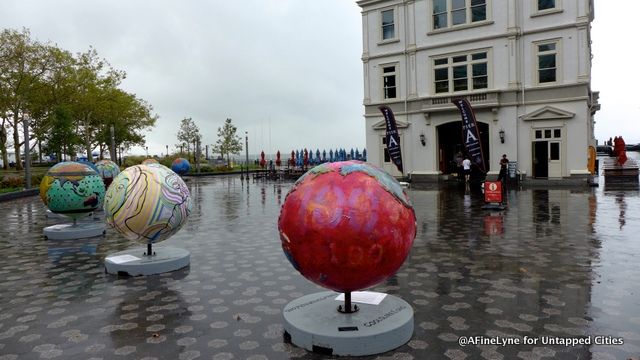
“Cool Globes: Hot Ideas for a Cooler Planet” on the plaza in front of Pier A
While not a permanent installation, the Cool Globes installation is still worthy of mention. Designed to bring awareness to global warming, each of the twelve globes carries a simple idea towards progress in preserving our planet. They will be located on the plaza opposite the recently restored Pier A through November 20.
For more about The Battery and Battery Park City, check here.
Get in touch with the author at AfineLyne
Subscribe to our newsletter